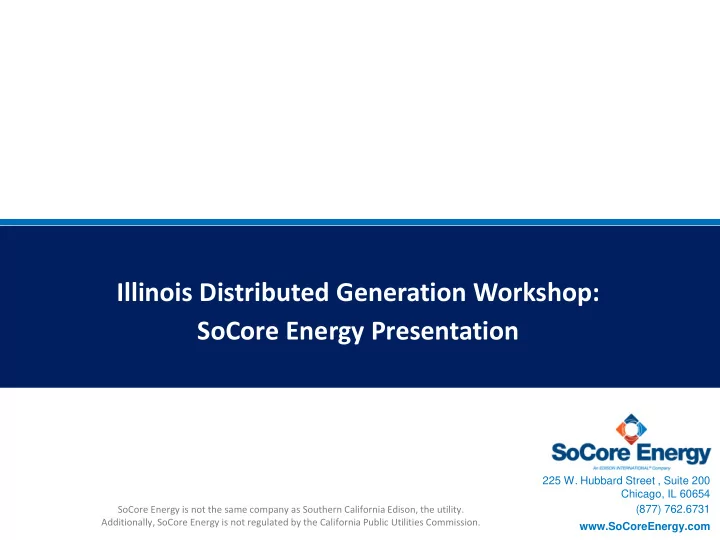

Illinois Distributed Generation Workshop: SoCore Energy Presentation 225 W. Hubbard Street , Suite 200 Chicago, IL 60654 SoCore Energy is not the same company as Southern California Edison, the utility. (877) 762.6731 Additionally, SoCore Energy is not regulated by the California Public Utilities Commission. www.SoCoreEnergy.com
Introduction to SoCore Energy SoCore Energy is a national commercial and industrial solar energy developer and is a • wholly owned subsidiary of Edison International (EIX). • SoCore handles every phase of a solar installation including pre-construction planning, array design, equipment procurement, permitting, incentive management and installation. • Currently, we have 308 installations across 12 states in operation or under construction. • We have constructed or are actively developing projects in CA, CT, DE, IL, MA, MI, MN, NJ, NY, OH, TX and UT. • Key clients include Walgreens, IKEA and other Fortune 500 retailers, Real Estate Investment Trusts (REITs) and industrial operators. We have installed solar on 17 sites in Illinois, with a total capacity of 2.9 MW DC. • • Notable installations include the Walgreens net zero store in Evanston, Illinois and 2 of the state’s largest rooftop PV installations at IKEA stores in Bolingbrook and Schaumburg. 2
2014 Proposed Program Design Features – Non-Residential Projects 5-year contract for RECs at competitive bid price • • Non-Residential Project Tiers: • Medium projects: ≥ 25 – 200 kW • Large projects: > 200 kW – 2 MW • The project must be installed by an Illinois certified DG installer, per statute, but the installer does not need to be selected at time of bid submission. • Delivery Term Start Date: There are number of options that work but we recommend the California Solar Initiative model: • 12 months for residential projects and 18 months for non-residential projects 3
2014 Proposed Procurement Process Features – Non-Residential Projects Hold bidders’ conference prior to opening solicitation. • • Bidders submit applications during 2-week application window. • Two week window avoids rush to submit. Bid Certification Form • • Requires signatures by Applicant, Energy Off-taker (utility customer) and Owner of the Project Site. The bid certification form represents site control. • Refundable deposit of $50/kW DC due at time of bid submission. Deposits will be refunded if projects are not selected or when the project is energized. • Selection Process: only completed bids received will be reviewed to ensure eligibility. Eligible bids will be ranked by bid price in each of the three project tiers. Wait List: Eligible bids that are not selected will be placed on a Wait List. • 4
2014 Proposed Program Design Features – Specific Issues • Role of Aggregators • We suggest that aggregators are unnecessary for non-residential projects and may create unnecessary administrative burdens. There is no precedent in other states for requiring the use of aggregators. • Credit Requirements • Other incentive programs assume performance through deposit requirements. We recommend that the refundable bid deposit is sufficient to meet this requirement. • New Vs. Existing Projects • We advocate that the money should go to new projects in order to spur solar growth in the state. Allocating money to projects that have already been built does not help grow the market. 5
Recommend
More recommend